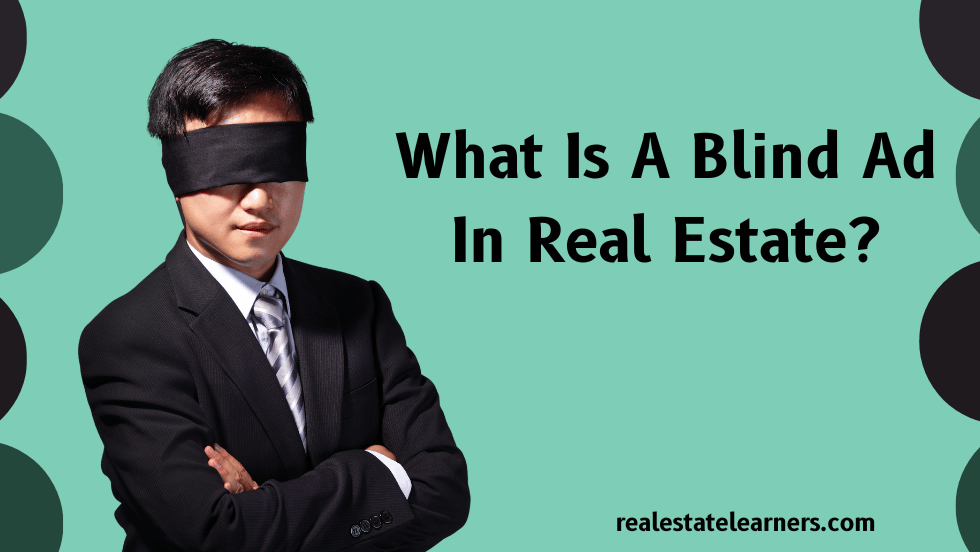Are you a student who wants to become a real estate agent? Or are you an established agent looking for new strategies to boost your business? Either way, blind advertising in the real estate industry is something that can greatly benefit you. In this post, we will provide you with valuable information on blind ads in real estate and how it can help you achieve success in your career.
What is a blind ad in real estate?
A blind ad in real estate refers to a type of advertisement that does not disclose the identity of the seller or the exact location of the property being sold. It is commonly used by sellers who want to maintain their privacy and avoid unwanted attention from potential buyers.
Blind ads usually provide minimal information about the property, such as its basic features, size, and price range. They typically do not include pictures or specific details that could reveal the identity of the seller.
What is an example of a blind ad?
“Beautiful 3-bedroom home for sale in a desirable neighborhood. Contact for more information.”
This ad does not mention the specific location, price, or features of the property, making it a blind ad. The seller may want to maintain their privacy and avoid disclosing too much information about the property.
“Spacious apartment available for rent in a prime location. Inquire for details.”
This ad does not reveal the exact location, rent price, or features of the apartment, making it a blind ad. The landlord may want to keep their address private or test the level of interest from potential renters before officially listing the property.
“Charming cottage for sale in a sought-after area. Call now for more information.”This ad does not disclose the specific location, selling price, or features of the cottage, making it a blind ad. The seller may want to maintain their privacy and avoid revealing too much information about the property.
“Luxury penthouse available for lease in an exclusive building. Contact for further details.”
This ad does not mention the exact address, rent price, or features of the penthouse, making it a blind ad. The landlord may want to keep their property private or only reveal certain details to serious inquiries.
Why do people use blind ads in real estate?
Maintain privacy: Some sellers or landlords may use blind ads to maintain their privacy and avoid disclosing too much information about the property.
Test interest: Blind ads can be used to test the level of interest from potential buyers or renters before officially listing the property on the market.
Avoid unwanted attention: By not revealing specific details about the property, blind ads can help sellers or landlords avoid unwanted attention from curious individuals or nosy neighbors.
Control information: By only revealing certain details to interested parties, sellers can control the flow of information and potentially create a sense of exclusivity around the property.
Create buzz: Blind ads can also generate buzz and excitement around a property, as potential buyers are left curious about the unknown details. This can potentially lead to a higher level of interest and more competitive offers.
What are the Risks Associated with Blind Ad in Real Estate?
While a blind ad may offer some benefits for the seller, there are also risks associated with using this type of advertisement.
Blind ads can also be used by unscrupulous individuals or businesses to scam people out of their money. These types of ads may promise a great deal on a property that does not exist or is not owned by the advertiser.
Since potential buyers or renters do not have all the necessary information about the property, they may skip over the ad and look for other properties that provide more details. This can lead to a lower number of inquiries and potentially result in a longer time on the market.
Blind ads do not disclose the exact location or price of the property, it may attract less serious buyers who are just browsing or looking for a bargain. This can result in wasted time and effort for the seller as they have to sift through numerous inquiries from unqualified buyers.
Some real estate agents may avoid working with properties advertised through blind ads as they are unable to properly evaluate the property or negotiate on behalf of their clients without all the necessary information.
What Can Sellers Do to Mitigate Risks in a Blind Ad?
Include general information: While a blind ad may not disclose specific details about the property, it is still important to include some basic information such as the type of property (e.g. single-family home, condominium), number of bedrooms/bathrooms, and approximate size. This can help filter out unqualified buyers and give potential buyers a better idea of what they are looking at.
Specify the location: Instead of providing the exact address, sellers can mention the general area or neighborhood where the property is located. This can help attract interested buyers in that particular area and give them a better idea of the surrounding community.
Use photos and videos: Including high-quality photos or videos of the property can give potential buyers a visual representation of what they are looking at. This can help generate more interest and inquiries, especially if the property has attractive features or amenities.
Work with a trusted agent: Sellers can also work with a reputable and experienced real estate agent who can help them navigate the process of selling through a blind ad. Agents have access to market data and tools that can help accurately price the property and attract serious buyers.
Be transparent and open: While blind ads are meant to maintain privacy, it is important for sellers to be honest and transparent with potential buyers when they reach out. This can help build trust and credibility, which is crucial in the real estate industry.
Be mindful of scams: Sellers should be wary of any suspicious inquiries or offers that seem too good to be true. They should verify the identity and intentions of potential buyers before disclosing any sensitive information or agreeing to a deal. It is always better to be safe than sorry.
Conclusion
As we wrap up our discussion on blind ads in real estate, it is important to note that these types of advertisements are still widely used today. While some may argue that they perpetuate discriminatory practices and limit opportunities for certain individuals, others argue that they offer a level playing field for all potential buyers or renters.
Regardless of personal opinions on the matter, it is crucial for real estate professionals to adhere to fair housing laws and regulations when creating and posting blind ads. This includes avoiding any language or visuals that may suggest a preference or limitation based on race, gender, religion, disability, or other protected characteristics.

Corey has over 15 years of experience as a real estate broker and educator. He is dedicated to providing valuable insights and guidance for those looking to enter the real estate industry.

